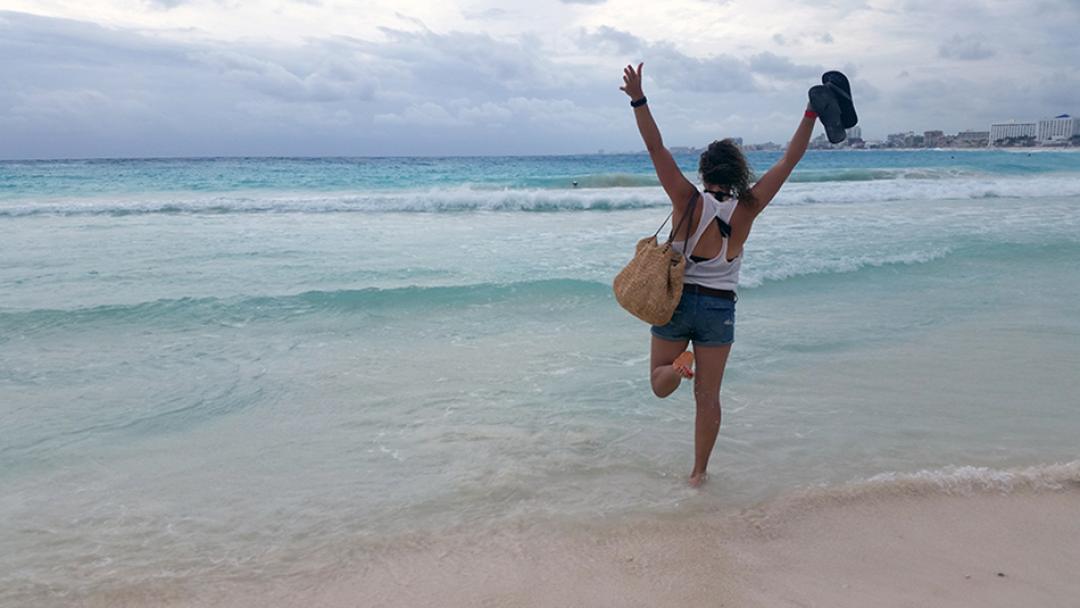
Professor Sarah Pressman enjoying her vacation time.
Sarah Pressman offers tips for making the most of your time off
Vacation and the anticipation of a trip near or far has psychological and physical benefits, studies show, so how can people make the most of their time away from work?
 Sarah Pressman, professor of psychological science, an associate dean in the Division of Undergraduate Education and director of the Stress, Emotion and Physical Health Laboratory, offers the following tips:
Sarah Pressman, professor of psychological science, an associate dean in the Division of Undergraduate Education and director of the Stress, Emotion and Physical Health Laboratory, offers the following tips:
- Find your escape: The most important thing is to actually take a break from the daily grind and embark on a vacation that truly allows you to disconnect and unwind. Americans ignore their vacation days at high rates and have a hard time disconnecting even during their time off. Try to leave your worries behind and indulge in activities that bring you joy and relaxation.
- Embrace the power of anticipation: Start reaping the benefits of your vacation even before you leave. Anticipating your time off can reduce stress and improve your well-being and make the happiness benefits of vacation last for much longer than just your time off. Plan exciting activities and create an itinerary that fuels your excitement.
- Regular respites matter: While long vacations are tempting, remember that regular breaks throughout the year are equally important. Don't put all your eggs in one basket. Incorporate shorter respites, regular leisure activities, and staycations into your routine to maintain your mental and physical health.
During a recent episode of the American Psychological Association’s podcast “Speaking of Psychology,” Pressman said that vacations or other leisure activities such as gardening or other hobbies produce physical benefits, including reducing blood pressure and stress hormones.
In response to a question about strategies that people could use in order to actually unplug during vacation, Pressman offered: “For some people, the unplugging could be more stressful than not unplugging. If you do love your job and it’s going to be worse for you not to do it, that could be consequential. But, if you really do need the break, because … it is critical for us to actually restore, there are so many things that you can do. You can leave your phone in your hotel room, don’t bring it with you. You can turn on an ‘away’ message. There is a great trend that I’ve seen with people putting on fabulous away messages on email that really says, ‘I’m not really checking my email. This is not something I’m doing.’ Or, put blocks on your phone. You can block your email so that maybe you only spend a certain amount of time or certain hours of the day, you’re only going to look at it. And, I think because of the overwhelming interference of technology right now and the constant distraction we have, companies really have stepped up to create a lot of programs to help us take a break. And, so, I think you just have to commit to that seriously and promise yourself that you will give yourself a true break.”
As for strategies for extending positive vacation vibes, Pressman said people should remember their happy experiences and try to relive them.
“Sharing it with other people is a great way to savor an experience,” she said. “There’s a lot of research that’s showing the anticipatory benefits of good things, not just in vacation, but anything, a concert, any kind of positive experience. It’s not just the concert or the vacation that gives us happiness, it’s the weeks leading up to it that really have this fade-in, anticipatory glow. So, why can’t we try to do that on the way out as well? Can we try to think back on it positively? Try to keep that positive emotion going for as long as possible.”
— Mimi Ko Cruz